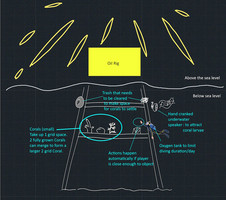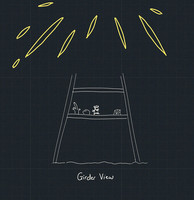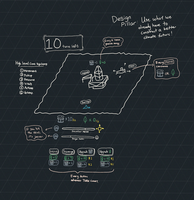Ideation



Initial Ideas
Design process:
When looking the theme of "Change the Story", our team started to first look at what the typical examples of "doom and gloom" was. From rising global temperatures, to sea level rising, dwindling biodiversity, etc. The most direct counter-response to the "doom and gloom" scenario was to show "hope". "Hope" that there is a different future, a different path of progression for what already exists.
One of the simplest ways to present hope would be to look at the up-and-coming sustainable technology (or green tech); to design a game that would leverage on such technological advances and give us "hope". However, this felt a little too optimistic. As we felt that it could seem a little too fantastical; we recognise that the laws of thermodynamics (specifically the second law) apply to all matter, humans and what we do as a species are no exception. In general, energy required to reverse the effects of global warming will also contribute to global warming.
On top of that, we understand that we have gone past various tipping points as an ecosystem on the whole, and that we cannot simply reverse the effects of global warming with the snap of our fingers. Therefore, we decided to take a more subtle approach instead. Imagine a receiving a half-written novel from the previous generation, and we are expected to continue writing it. Given that what was written has already come to pass and cannot be changed, how would we (as a generation) write the next chapter?
How might we best play the game of life with the hand of cards that we are dealt?
Exploring Secondary Themes
Some of the secondary themes we wanted to explore alongside the main one, are "ripple effects", "energy budgeting", "moving cities" and "ethical choices".
Ripple Effect
How might a small action result in a large change across time. This gave us inspiration on creating a Real-time-strategy-like game, where we had the player control various characters to perform various tasks. To demonstrate the idea of individuals coming together, contributing, for a greater cause.
Energy Budgeting
Global warming can be (overly) simplified into the following sentence: humans are drawing energy from within the Earth and releasing it to the surface. Inspired by resource management games, what we if put players into the role of a "god" and manages resources for their worshippers on an island? Can they satisfy the islanders' needs (food, shelter, etc) without excessively drawing upon fossil fuels? Will players try to expand their population endlessly? How do players tell when is it enough?
Moving cities
There are ideas about having cities move together with the sun, to constantly be able to rely on solar energy as a main energy source. Given that land masses may not always be the best medium for large moving cities, what if we drifted on the ocean? This gave us the idea of looking into oil rigs as some can be large enough to house a small village. A seafaring moving city that embarks on quests, and moves around to connect other cities together (ref: Death Stranding) .
Ethical Choices
Humans innovated and created technology for the betterment of their lives. Unbeknownst to them, it is at the cost of the nature around them. Armed with that knowledge now, what if we put players in a situation where they can choose to make sacrifices to progress, in exchange for "penalties" down the line? We thought of designing a rogue-lite card game with fantasy elements, where players could leverage on the more powerful "dark energy" to gain a burst of power, or solely rely on the "light energy" to survive.
Finalising the Main Theme:
Recognising our Limitations
We felt that it was tough to marry the secondary themes into the main theme "Change the Story", as it could balloon the scope massively. We were all trying out Godot for the first time and were also trying out new roles! So we decided to keep it simple and work on the core first.
Deciding on the Core
Having done some reading, one thing that stood out to us was the idea of repurposing decommissioned oil rigs. Can something that was built as a catalyst to accelerate global warming do the opposite? This seemed to best match out initial concept of "how might we best play the game of life with the hand of cards that we are dealt". The rig has already been built. It has already served its purpose. Now what?
Idea #1
We then explored ideas about converting the oil rig into a renewable energy plant, modifying the rig to have the means to generate green energy of all kinds. Players would be given a limited amount of time/actions to be able to do this conversion. They would have to strategise and optimise their approach to win the game.
Players would start off as a traditional boat using fuel, going around the map to search for scrap metal and fish for food. Scrap metal will be used to convert the rig to provide renewable energy. While food is required for daily upkeep of the player. The balancing act comes in the form of the use of the newly implemented green energy, versus the use of traditional fuel, which is more efficient at the beginning. The longer the player takes to transition out of fuel, the more pollution would affect their food source availability, eventually leading to their demise.
However, before we dove into creating this game, we took a step back to look at this design from a macro perspective. It has inevitably returned to the "doom and gloom" scenario that we were trying to hard to avoid. So we scrapped this idea and went back to the drawing board.
Idea #2
While still hooked onto the topic of oil rigs, we then looked at how some decommissioned oil rigs were left as they were, because they have turned into offshore coral reefs. As of today, there are still debates challenging the "naturalness" of coral reefs growing on man-made structures, and other claims that oil-companies are using the preservation of these oil-rig-reefs as an excuse to not carry out dismantling of the oil rig due to their exorbitant costs.
Regardless, we felt that this was a potential story to share with the wider community. Corals are more than just a visually appealing collection of organisms for humans to marvel at. They are essential to the marine ecosystem. They are home to a large diversity of marine life and provide breeding grounds for various others. As of now, the rising temperatures of the ocean have caused many coral reefs around the world to begin bleaching and losing their function in the ecosystem. This could potentially lead to a wider problem on a global scale, should there be an ecological collapse. Without proper nurseries or breeding grounds, some species of marine life could go extinct, leading to a cascading effect along the food web.
Now that there is a new opportunity, a new place where corals can thrive, should we not preserve them? And if we do, we could perhaps prevent the inevitable, we could be writing a new chapter where these offshore coral reefs are now the new homes for the marine life that rely upon them. On a smaller scale, this would be changing the story of an oil rig. Instead of being demolished at the end of its life, it is now kept as a primer for more marine life! And on the macro scale, we are also changing the story of losing our beloved coral reefs entirely, to having some coral reefs at offshore locations!
With that, we present to you, Coral Song:
https://drive.google.com/file/d/1u4u2egH76ENbvyu6BBuJXRod_4BTHK9r/view?usp=drive...
Coral Song
For Climate Game Jam 2024
| Status | Prototype |
| Authors | zivankira, TylerIsland, sweeyee3, k1nc |
| Genre | Simulation |
| Tags | Atmospheric, Casual, Godot, Indie, nature, underwater |
More posts
- Final SubmissionJul 21, 2024
Leave a comment
Log in with itch.io to leave a comment.